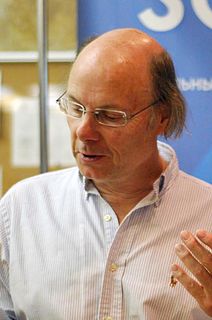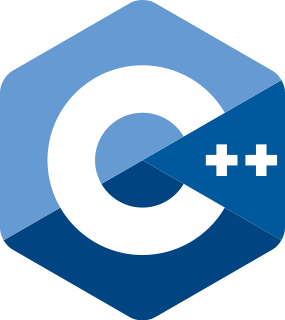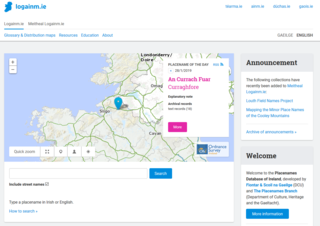Related Research Articles

Bjarne Stroustrup is a Danish computer scientist, most notable for the invention and development of the C++ programming language. As of July 2022, Stroustrup is a professor of Computer Science at Columbia University.

COBOL is a compiled English-like computer programming language designed for business use. It is an imperative, procedural and, since 2002, object-oriented language. COBOL is primarily used in business, finance, and administrative systems for companies and governments. COBOL is still widely used in applications deployed on mainframe computers, such as large-scale batch and transaction processing jobs. However, due to its declining popularity and the retirement of experienced COBOL programmers, programs are being migrated to new platforms, rewritten in modern languages or replaced with software packages. Most programming in COBOL is now purely to maintain existing applications; however, many large financial institutions were still developing new systems in COBOL as late as 2006.
Doublespeak is language that deliberately obscures, disguises, distorts, or reverses the meaning of words. Doublespeak may take the form of euphemisms, in which case it is primarily meant to make the truth sound more palatable. It may also refer to intentional ambiguity in language or to actual inversions of meaning. In such cases, doublespeak disguises the nature of the truth.

The Dewey Decimal Classification (DDC), colloquially known as the Dewey Decimal System, is a proprietary library classification system which allows new books to be added to a library in their appropriate location based on subject. It was first published in the United States by Melvil Dewey in 1876. Originally described in a 44-page pamphlet, it has been expanded to multiple volumes and revised through 23 major editions, the latest printed in 2011. It is also available in an abridged version suitable for smaller libraries. OCLC, a non-profit cooperative that serves libraries, currently maintains the system and licenses online access to WebDewey, a continuously updated version for catalogers.

Hindi, or more precisely Modern Standard Hindi, is an Indo-Aryan language spoken chiefly in the Hindi Belt region encompassing parts of northern, central, eastern, and western India. Hindi has been described as a standardised and Sanskritised register of the Hindustani language, which itself is based primarily on the Khariboli dialect of Delhi and neighbouring areas of North India. Hindi, written in the Devanagari script, is one of the two official languages of the Government of India, along with English. It is an official language in 9 states and 3 union territories and an additional official language in 3 other states. Hindi is also one of the 22 scheduled languages of the Republic of India.

C++ is a general-purpose programming language created by Danish computer scientist Bjarne Stroustrup as an extension of the C programming language, or "C with Classes". The language has expanded significantly over time, and modern C++ now has object-oriented, generic, and functional features in addition to facilities for low-level memory manipulation. It is almost always implemented as a compiled language, and many vendors provide C++ compilers, including the Free Software Foundation, LLVM, Microsoft, Intel, Embarcadero, Oracle, and IBM, so it is available on many platforms.

The English Wikipedia is, along with the Simple English Wikipedia, one of two English-language editions of Wikipedia, an online encyclopedia. It was founded on 15 January 2001 as Wikipedia's first edition and, as of 21 October 2022, has the most articles of any edition, at 6,564,680. As of October 2022, 11% of articles in all Wikipedias belong to the English-language edition; this share was more than 50% in 2003. The edition's one-billionth edit was made on 13 January 2021.

The Linguistic Society of America (LSA) is a learned society for the field of linguistics. Founded in New York City in 1924, the LSA works to promote the scientific study of language. The society publishes three scholarly journals: Language, the open access journal Semantics and Pragmatics, and the open access journal Phonological Data & Analysis. Its annual meetings, held every winter, foster discussion amongst its members through the presentation of peer-reviewed research, as well as conducting official business of the society. Since 1928, the LSA has offered training to linguists through courses held at its biennial Linguistic Institutes held in the summer. The LSA and its 3,600 members work to raise awareness of linguistic issues with the public and contribute to policy debates on issues including bilingual education and the preservation of endangered languages.

The chairperson, also chairman, chairwoman or chair, is the presiding officer of an organized group such as a board, committee, or deliberative assembly. The person holding the office, who is typically elected or appointed by members of the group, presides over meetings of the group, and conducts the group's business in an orderly fashion.
ISO 639-5:2008 "Codes for the representation of names of languages—Part 5: Alpha-3 code for language families and groups" is a highly incomplete international standard published by the International Organization for Standardization (ISO). It was developed by ISO Technical Committee 37, Subcommittee 2, and first published on May 15, 2008. It is part of the ISO 639 series of standards.

The Placenames Database of Ireland, also known as logainm.ie, is a database and archive of place names in Ireland. It was created by Fiontar, Dublin City University in collaboration with the Placenames Branch of the Department of Tourism, Culture, Arts, Gaeltacht, Sport and Media.
The national symbols of the Philippines consist of symbols that represent Philippine traditions and ideals and convey the principles of sovereignty and national solidarity of the Filipino people. Some of these symbols namely the national flag, the Great Seal, the coat of arms and the national motto are stated in the Flag and Heraldic Code of the Philippines, which is also known as Republic Act 8491. In the Constitution of the Philippines, the Filipino language is stated as the national language of the Philippines. Aside from those stated symbols in the Constitution and in Republic Act 8491, there are only six official national symbols of the Philippines enacted through law, namely sampaguita as national flower, narra as national tree, the Philippine eagle as national bird, Philippine pearl as national gem, arnis as national martial art and sport and the Filipino Sign Language as the national sign language. Thus, there is a total of twelve official national symbols passed through Philippine laws.
Man Met, or Kemie, is a poorly classified Austroasiatic language spoken by about 1,000 people in Jinghong County, Xishuangbanna, China. It is classified as an Angkuic language by Paul Sidwell (2010). It may be or Mangic according to Li Yunbing (2005), or Palaungic. Like most other Austroasiatic languages, Kemie has subject–verb–object (SVO) word order.
Mang is an Austroasiatic language of Vietnam, China, and Laos. It is spoken mainly in Lai Châu Province, Vietnam and across the border in Jinping County, China. It was first documented only in 1974.
The Bati–Angba or Bwa languages are a clade of Bantu languages, about half of Zone C.40 in Guthrie's classification. According to Nurse & Philippson (2003), these languages form a valid node. They are:
The 51st National Film Awards, presented by Directorate of Film Festivals, the organisation set up by Ministry of Information and Broadcasting, India to felicitate the best of Indian Cinema released in the year 2003.

The 60th National Film Awards ceremony was an event during which the Directorate of Film Festivals presented its annual National Film Awards to honour the best films of 2012 in the Indian cinema. The ceremony was held on 3 May 2013 and was hosted by Bollywood actors R. Madhavan and Huma Qureshi.
The 19th National Film Awards, presented by Ministry of Information and Broadcasting, India to felicitate the best of Indian Cinema released in the year 1971.
The 61st National Film Awards ceremony was an event during which the Directorate of Film Festivals of India presented its annual National Film Awards to honour the best films of 2013 in the Indian cinema. The ceremony was held on 3 May 2014.
References
- ↑ Pagibete at Ethnologue (18th ed., 2015) (subscription required)
- ↑ Jouni Filip Maho, 2009. New Updated Guthrie List Online
- ↑ Pagabete Language Committee 2013.
- Pagabete Language Committee (2013). "Dictionnaire pagabete". Webonary. Retrieved 25 June 2021.